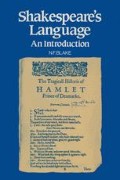Abstract
In the last chapter little was said of extensions because these are not so likely to cause difficulty to modern readers and because they are often formed of prepositions which could be alternatively interpreted as adverbs. This applies also in Modern English since the extension may be separated from the verb element of the verbal group. Hence we can say ‘Drink up your beer’ or ‘Drink your beer up’. The unfamiliarity of Shakespearian idiom may sometimes make it difficult to decide whether a word like up should be interpreted as part of the verbal group or as an independent adverb, although the difference in meaning is not likely to be great. When Shakespeare writes ‘To fill the mouth of deepe Defiance vp’ (1H4 III ii 116), it is possible to take vp either way, and most readers would probably think of it as the extension in the verbal group fill vp. Shakespeare has separated the vp from the verb to throw it into emphasis and so it has more the function of an adverb with the sense ‘to the brim, completely’. It is perhaps better to think of it as an adverb in order to bring home this extra meaning which Shakespeare intended. A more tricky example is provided in King Richard the Third when Richard says:
for it stands me much vpon
To stop all hopes, whose growth may dammage me. (IV ii 60–1)
Preview
Unable to display preview. Download preview PDF.
Notes
J. H. P. Pafford, The Winter’s Tale (London: Methuen, 1963) p. 68, see note to III iii 48–9.
Author information
Authors and Affiliations
Copyright information
© 1983 N. F. Blake
About this chapter
Cite this chapter
Blake, N.F. (1983). Adverbs, Prepositions and Conjunctions. In: Shakespeare’s Language. Palgrave, London. https://doi.org/10.1007/978-1-349-17051-7_7
Download citation
DOI: https://doi.org/10.1007/978-1-349-17051-7_7
Publisher Name: Palgrave, London
Print ISBN: 978-0-333-28639-5
Online ISBN: 978-1-349-17051-7
eBook Packages: Palgrave Literature & Performing Arts CollectionLiterature, Cultural and Media Studies (R0)

